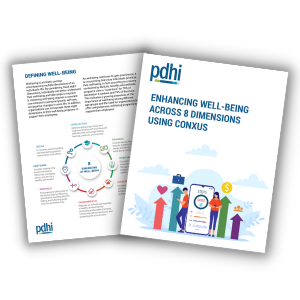The 8 Dimensions of Well-being: A Holistic Approach to a Balanced and Healthy Life

Well-being is an evolving concept with interconnected dimensions that provide the foundation for a fulfilling life. Physical, emotional, social, intellectual, environmental, occupational, financial, and spiritual well-being are the common dimensions that address improved quality of life and health.
By including all these components in a holistic well-being program, people can take a more comprehensive approach to their health. Supporting individuals in every area of their lives leads to better outcomes and increased happiness. Let’s explore each one in more detail.
Physical well-being encompasses taking care of the whole body by following good habits, avoiding harmful habits, and following guidelines for preventive care. Good habits include regular exercise and a balanced diet that provides essential fuel for the body. Bad habits that can be harmful to a person’s health include smoking, drinking, and poor hygiene. At the same time, preventive care includes compliance with check-ups, vaccinations, and recommended screenings.
Emotional well-being is a vital component of overall health and happiness. It includes experiencing positive emotions, effectively managing stress, and having a healthy self-esteem. Positive emotions are the foundation of emotional well-being, while managing stress is crucial for emotional well-being, as prolonged stress can lead to physical and mental health problems.
Social well-being is centered around building and maintaining positive relationships with others. It involves developing and maintaining healthy relationships, fostering social connections, and cultivating a sense of belonging. Strong social connections are essential for maintaining emotional well-being, reducing the risk of mental health problems, and improving overall physical health.
Intellectual well-being refers to enhancing mental and cognitive abilities with activities and attitudes that encourage lifelong learning, creativity, and curiosity. Lifelong learning is the core of intellectual well-being and involves continuously seeking new knowledge and skills. Engaging in creative and stimulating activities and cultivating an open and curious mind nurtures intellectual well-being.
Environmental well-being requires us to build and maintain a healthy environment. It involves promoting sustainable practices, conserving natural resources, and protecting the environment. Environmental well-being is essential for promoting physical health, reducing the risk of health problems, and creating a sustainable future for generations to come.
Occupational well-being combines finding purpose and meaning in work, achieving work-life balance, and avoiding burnout. Occupational well-being can lead to better physical health outcomes, such as lower rates of chronic diseases and a decreased risk of workplace injuries. Employers can benefit from promoting occupational well-being, leading to increased employee engagement, reduced turnover rates, and improved business outcomes.
Financial well-being involves having financial security, meeting financial needs, and having peace of mind about money. Financial stress can profoundly impact overall well-being, and organizations providing wellness services should prioritize promoting financial well-being. Strategies for achieving financial well-being include encouraging organization, promoting saving, investing in the future, avoiding debt, and seeking professional advice from a financial advisor.
Spiritual well-being focuses on finding meaning and purpose through spirituality, religion, or personal beliefs. It consists of cultivating inner peace and harmony and connecting to something greater than oneself. To cultivate spiritual well-being, individuals may embrace their faith through prayer, engage with nature, or practice meditation. Studies have linked higher spiritual well-being to decreased risk for depression and substance use.
To achieve optimal health and balance, there must be a balance in each of these areas. All dimensions are equally important. Therefore, health solutions must centralize around these dimensions to provide comprehensive care to their employees, members, and patients.
Platforms like ConXus can help individuals enhance their well-being through personalized assessments that generate health recommendations, engaging challenges and activities covering a variety of health topics, and connecting them with resources such as a financial planner or employee assistance programs. With these tools, individuals can take control of their well-being and lead happier, more fulfilling lives.
To learn more about how ConXus incorporates the eight dimensions of well-being, download the guide below with bonus downloadable images for each dimension to use in your program marketing and communications.
Get the White Paper
Enhancing Well-being Across 8 Dimensions using ConXus


